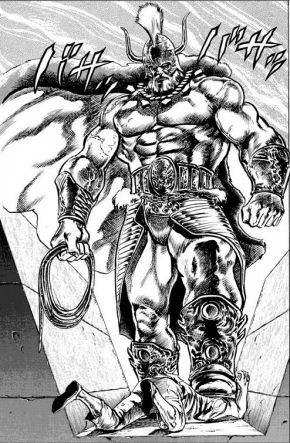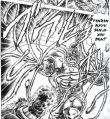Uighur: Difference between revisions
Appearance
Endofcentury (talk | contribs) |
Endofcentury (talk | contribs) |
||
| Line 58: | Line 58: | ||
File:Taizan_Ryu_Senjo_Ben.jpg|Uighur performs Taizan-ryū Sōjō Ben | File:Taizan_Ryu_Senjo_Ben.jpg|Uighur performs Taizan-ryū Sōjō Ben | ||
File:Moko_Hakyoku_Do.jpg|Uighur performs Mōko Hakyoku Dō | File:Moko_Hakyoku_Do.jpg|Uighur performs Mōko Hakyoku Dō | ||
File:Uighur4.jpg|Uighur rises from the grave | |||
File:Uighur.png|Uighur Laughing | File:Uighur.png|Uighur Laughing | ||
File:Uighur.jpg | File:Uighur.jpg | ||
Revision as of 18:03, 17 January 2021
| Uighur the Warden | |
|---|---|
 Uighur | |
| Name in Kanji | ウイグル獄長 |
| Name in Romaji | Uiguru Gokuchō |
| Alternate spelling(s) |
Uyghur Uygle Wigul |
| Fighting Style |
Taizan-ryu Sojo Ben Taizan-ryu Senjo Ben Moko Hakyoku Do |
| Allegiance(s) | Raoh |
| Position(s) | Warden of Cassandra |
| Appearances | Manga (ch. 53-57, 59), Anime (ep. 37-42), Raoh Gaiden, 1986 Movie |
| Voice actor(s) |
Daisuke Gōri Kenta Miyake (Ten no Haoh, Ten no Haoh PSP) Ryūzaburō Ōtomo (Hokuto Musou, Shin Hokuto Musou) Naomi Kusumi (Hokuto ga Gotoku) Tsuguo Mogami (Legends ReVIVE) Gregory Snegoff (1986 movie dub) Rob Mungle (Ten no Haoh dub) Alan Shearman (Hokuto Musou dub) Paul St. Peter (Hokuto ga Gotoku dub) |
- Uighur, the Warden (ウイグル獄長 Uiguru Gokuchō, ئۇيغۇر) Error creating thumbnail: /bin/bash: line 1: convert: command not found
- The warden of Cassandra prison and an Uyghur whose ancestors lived in ancient Mongolia. He fights using the Taizan-ryu Sojo Ben (泰山流双条鞭, "Taishan Style Twin Streak Whip") style.
- In the spin-off prequel, Uighur was originally a prisoner of Cassandra who had survived five separate executions until his meeting with Raoh. Raoh gauges his strength and learns of Uighur's dream to create his own legend. This earns Raoh's approval and Uighur is named the new Warden of Cassandra, at Gion's expense.
Manga & TV Series
- Uighur's cruel and bloody reign built a legend of terror at Cassandra, as he reveled in the screams of the tortured souls locked within its walls. Uighur stood before Kenshiro, who had stormed the prison to free the imprisoned Toki. He managed to overwhelm Kenshiro with his true form, Moko Hakyoku Do (蒙古覇極道, "Tao of the Mongolian Champion"), a charging tackle which concentrates all his muscle and strength into one shoulder. However, Kenshiro recovered and countered the move by crushing Uighur's shoulder with Hokuto Koretsu Ha, before finishing him with the Hokuto Hyakuretsu Ken. Uighur was sent crashing into an unmarked grave that he had originally dug for Kenshiro, his gargantuan body contorting itself to fit inside before Uighur explodes. Somehow Uighur survives long enough to rise up from his grave and issue a final warning that Kenshiro and Toki mustn't meet, before the rest of his mutilated body finally explodes.
- In the anime adaptation, Uighur has an assistant warden, Targel who comes with a plan to pit the prisoner Bella against Kenshiro. Uighur's death scene is changed so ne longer says "UWARABA" instead saying "Lord Ken-oh." Additionally Uighur says "help me" in the anime, whilst Uighur is defiant to Kenshiro in the manga.
- Uighur appears in the movie version as the second-in-command and public executioner of Ken-Oh's army. He fights with Rei at Cassandra, but his whips are foiled and he is sliced into pieces by Rei's Nanto Suicho Ken.
Video Games
- Uighur is a popular boss in the video games for the series and is a playable character on rare occasions.
- The Sega Mark III game has Uighur as the first sub boss of level 4 where he is much smaller then the manga. During the level, Uighur's hawk attacks the player. In the Black Belt Localization, Uighur is turned into a ninja in red.
- The gameboy fighting game has Uighur as a fighter. The fifth boss in the campaign mode, Uighur is a playable character in the tournament mode. His attacks are his whips and mongolian tackle instead of punches and kicks.
- Hokuto No Ken Seikimatsu Kyūseishu Densetsu features Uighur as a one on one boss battle in chapter 4. In the games VS mode, Uighur is unlocked as a playable character if he is beaten in story mode without continues.
- Uighur is a character in Hokuto Musō, he functions as a boss in legend mode serving his role in the manga. In Challenge mode and Raoh's dream mode, Uighur may function as an ally character.
- Uighur plays effectively the same role in Shin Hokuto Muso.
- In the 2018 video game, Hokuto ga Gotoku, Uighur makes an appearance as a non-playable boss character. He suffers the same fate as he does in the manga.
Character Rating
From Hokuto no Ken: Kyūkyoku Kaisetsusho: Seikimatsu Haō Retsuden.
- Level: B
- Power: 5
- Speed: 3
- Skills: 3
- Looks: 2
- Charisma: 3
Notes
- While there are many giant characters in the series, Uighur's gigantic height is referenced a lot, he is frequently called a giant, is said to weigh 770 pounds and had to be folded in half to fit into a grave built for the 6 feet tall Kenshiro.
- The final boss of the Data East game Hippodrome, Pon the Giant closely resembles Uighur and has a similar move to Moko Hakyoku Do. In the sequel Death Brade, Pon becomes one of the main protagonists and is playable.
- Uighur is Tetsuo Hara's favorite rogue.
- Along with Kaiser and Bolge, Uighur is one of the few people to not be killed instantly after having most of his body exploded.
Gallery
-
Uighur in the TV series
-
Uighur performs Taizan-ryū Sōjō Ben
-
Uighur performs Mōko Hakyoku Dō
-
Uighur rises from the grave
-
Uighur Laughing
-
Kenshiro crushes Uighur's shoulder
-
Uighur dies
-
Uighur in the 1986 movie
-
Uighur performing Taizan-ryū Senjō Ben in the 1986 movie
-
Ten No Haoh model sheet for Uighur
-
Ten No Haoh Model sheet
-
Uighur in Hokuto No Ken 3
-
Uighur in Hokuto no Ken: Legends ReVIVE (illustration)





















